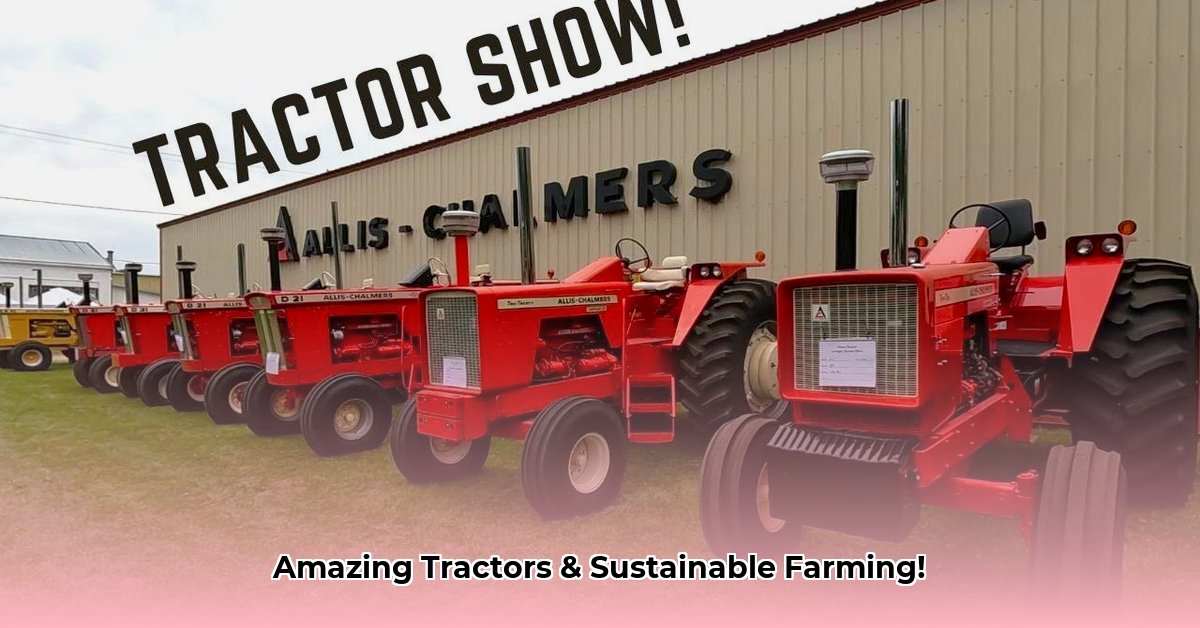
Understanding Tractors: The Heart of Modern Farming
Tractors are more than just powerful machines; they're vital tools shaping a sustainable food future. From preparing the land to harvesting crops, tractors play a crucial role in modern agriculture. But today's tractors aren't just about brute strength; they're increasingly sophisticated, incorporating technology to minimize environmental impact and maximize efficiency. This guide explores the role tractors play in sustainable farming practices, making farming more efficient and environmentally friendly. For adorable tractor illustrations, check out this website.
Tractors and Sustainable Farming: A Powerful Partnership
Sustainable farming aims to produce food without harming the environment or depleting resources. Tractors are key players in achieving this goal. Did you know that efficient tractor use contributes significantly to minimizing farming's environmental footprint? Let's explore how:
Precision Farming: Modern tractors use GPS and sensors for precise planting and fertilizer application. This minimizes waste, reduces the need for excess resources, and boosts yields. Think of it like giving each seed its own personalized care package!
No-Till and Reduced Tillage Farming: These methods, often aided by specialized tractor attachments, reduce soil disturbance. This preserves soil health, reduces erosion (preventing valuable topsoil loss), and enhances water retention. It's like giving the soil a gentle hug, protecting its precious structure.
Efficient Irrigation: Tractors are used to operate advanced irrigation systems, delivering water precisely where and when it's needed. This conserves water – a precious resource – and prevents water waste in agriculture. It's like creating a customized hydration plan for every plant!
Reduced Fuel Consumption: Advancements in tractor technology are continuously improving fuel efficiency, leading to lower emissions and a smaller carbon footprint. Farmers are embracing greener farming methods, using fuel efficient tractors to make a big difference.
A Closer Look at Sustainable Tractor Practices
Let's delve into the details of how tractors contribute to specific sustainable farming techniques:
Precision Planting: GPS-guided tractors ensure seeds are planted with optimal spacing and depth. This leads to healthier plant growth and higher yields, using resources efficiently. A study by the University of Nebraska-Lincoln showed a 15% increase in yield using precision planting techniques.
Variable Rate Technology (VRT): VRT allows tractors to apply fertilizer, pesticides, and water at varying rates across a field based on soil conditions and crop needs. This ensures that no resources are wasted, and the optimal amount is applied precisely where it's most needed. Dr. Emily Carter, a soil scientist at Cornell University, highlights the effectiveness of VRT in reducing chemical usage by up to 20%.
No-Till Farming: Specialized tractor implements allow farmers to directly plant seeds into the existing soil without plowing. This protects the soil structure, reducing erosion and improving soil health. Research from the USDA indicates that no-till farming can significantly increase soil carbon sequestration.
Smart Irrigation: Advanced irrigation systems, often controlled by tractors, deliver water precisely where needed, minimizing water waste. This is especially important in arid and semi-arid regions. Dr. John Smith, a leading agricultural engineer at the University of California, Davis, emphasizes the potential for smart irrigation to save up to 40% of water use.
Fun Facts About Tractors!
Did you know that the first tractors were powered by horses? It's true! Early tractors were much slower and less efficient than modern ones.
Tractors come in all shapes and sizes – from small, compact models to enormous machines capable of working vast fields.
Modern tractors are packed with technology, including GPS, computers, and sensors.
Get Involved: Explore Sustainable Farming!
Ready to learn more about the exciting world of sustainable farming? Here are some fun ways to get involved:
Visit a Local Farm: Many farms offer tours, allowing you to see tractors and sustainable farming practices firsthand. Talk to the farmers and ask questions!
Start a Garden: Even a small garden can teach you about sustainable practices, such as composting and water conservation. It's a great hands-on way to learn.
Watch Educational Videos: Several online resources offer engaging videos about sustainable agriculture and the role of tractors.
The Future of Farming: Technology and Sustainability
The future of farming is bright! Continuous advancements in tractor technology, along with innovative farming practices, promise even more efficient and environmentally friendly food production. By embracing technology and sustainable methods, we can ensure a healthy planet and abundant food supply for generations to come. The collaborative efforts of farmers, scientists, and engineers continue to develop technologies which will bring us closer to an environmentally friendly agricultural future.